无现金社会 cashless society
“无现金时代”即将到来-
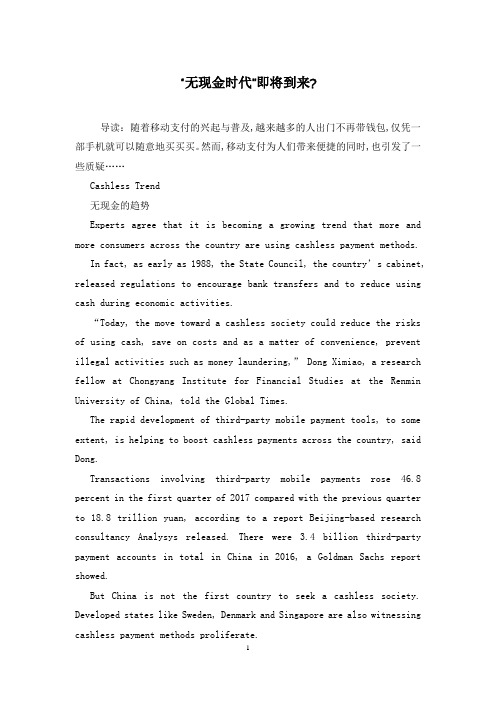
“无现金时代”即将到来?导读:随着移动支付的兴起与普及,越来越多的人出门不再带钱包,仅凭一部手机就可以随意地买买买。
然而,移动支付为人们带来便捷的同时,也引发了一些质疑……Cashless Trend无现金的趋势Experts agree that it is becoming a growing trend that more and more consumers across the country are using cashless payment methods.In fact, as early as 1988, the State Council, the country’s cabinet, released regulations to encourage bank transfers and to reduce using cash during economic activities.“Today, the move toward a cashless society could reduce the risks of using cash, save on costs and as a matter of convenience, prevent illegal activities such as money laundering,” Dong Ximiao, a research fellow at Chongyang Institute for Financial Studies at the Renmin University of China, told the Global Times.The rapid development of third-party mobile payment tools, to some extent, is helping to boost cashless payments across the country, said Dong.Transactions involving third-party mobile payments rose 46.8 percent in the first quarter of 2017 compared with the previous quarter to 18.8 trillion yuan, according to a report Beijing-based research consultancy Analysys released. There were 3.4 billion third-party payment accounts in total in China in 2016, a Goldman Sachs report showed.But China is not the first country to seek a cashless society. Developed states like Sweden, Denmark and Singapore are also witnessing cashless payment methods proliferate.专家们承认,国内(中国)越来越多的消费者正在使用无现金的支付方式,这成为一种日渐增长的趋势。
是否应该推行无现金社会辩论辩题

是否应该推行无现金社会辩论辩题正方(应该推行无现金社会):作为正方辩手,我认为应该推行无现金社会。
首先,无现金社会可以提高交易效率,减少现金交易所带来的时间成本和安全隐患。
根据瑞银集团的一项研究,全球每年因现金交易而产生的成本高达1.6万亿美元,而无现金社会可以大大减少这一成本。
此外,无现金社会也可以更好地监管经济活动,减少逃税和洗钱等非法行为。
例如,瑞典已经逐渐实现了无现金社会,据报道,瑞典的逃税率已经大幅下降。
其次,无现金社会可以促进金融包容,让更多人融入金融体系。
根据世界银行的数据,全球仍有超过1.7亿人没有银行账户,而无现金社会可以通过电子支付等方式让这部分人群融入金融体系,从而提高经济发展的包容性。
正如比尔·盖茨所说,“无现金支付可以让贫困人口更容易获得金融服务,从而帮助他们脱离贫困。
”。
最后,无现金社会也有利于环境保护。
现金的生产和流通过程会消耗大量资源和能源,而无现金社会可以减少这一消耗,降低对环境的负面影响。
因此,无现金社会符合可持续发展的理念。
综上所述,无现金社会可以提高交易效率、促进金融包容、有利于监管经济活动和环境保护,因此应该推行无现金社会。
反方(不应该推行无现金社会):作为反方辩手,我认为不应该推行无现金社会。
首先,无现金社会可能会加剧数字鸿沟,让那些不熟悉电子支付的人群面临更大的障碍。
根据联合国的数据,全球仍有超过40%的人口没有接触过互联网,而无现金社会可能会让这部分人群失去交易的能力。
其次,无现金社会可能会增加个人信息泄露和网络安全风险。
随着电子支付的普及,个人的交易信息可能会更容易被黑客窃取,从而增加个人财产安全的风险。
例如,美国曾发生过多起电子支付系统被黑客攻击的案例。
最后,无现金社会可能会剥夺人们的现金支付权利,影响个人的自由选择。
正如约翰·梅尔顿·凯恩斯所说,“如果现金支付被废除,我们将失去一种自由选择的权利。
”因此,无现金社会可能会对个人权利造成影响。
是否应该推行无现金社会?辩论辩题

是否应该推行无现金社会?辩论辩题正方辩手:应该推行无现金社会。
首先,无现金社会可以减少犯罪率。
据统计,大部分抢劫案都是为了抢夺现金而发生的。
如果没有现金,抢劫案件的发生率将大大降低。
其次,无现金社会可以提高经济效率。
现金交易需要大量的时间和资源来处理和管理,而电子支付可以更快捷地完成交易,提高了效率。
此外,无现金社会还可以减少黑市交易和逃税行为,有利于国家税收的增加。
最重要的是,无现金社会可以促进金融包容性,让更多的人都能享受到金融服务,包括那些没有银行账户的人。
因此,推行无现金社会是符合时代潮流和社会发展需要的。
反方辩手:不应该推行无现金社会。
首先,无现金社会可能会导致个人隐私权受到侵犯。
电子支付的信息可能会被监控和泄露,使个人的隐私不再受到保护。
其次,无现金社会可能会排斥一部分人群,特别是那些不熟悉电子支付方式或者没有接触过数字化设备的人。
这些人可能会因为无法适应无现金社会而被边缘化。
此外,无现金社会也会增加依赖于技术的风险,一旦电子支付系统发生故障或被黑客攻击,整个社会的经济秩序都会受到严重影响。
因此,不应该轻率地推行无现金社会。
名人名句:“金钱是一切罪恶的根源。
”——圣经《提摩太前书》6:10。
“金钱是人类历史上最伟大的发明之一,但也是最大的诱惑。
”——约瑟夫·肯尼迪。
经典案例:瑞典是世界上最早开始推行无现金社会的国家之一。
瑞典政府大力推广电子支付,几乎所有的商家都接受电子支付,现金交易已经非常罕见。
然而,这也导致了一些问题,比如老年人和偏远地区的居民因为无法适应电子支付而面临生活困难。
同时,瑞典也面临着电子支付系统被黑客攻击的风险,一旦发生系统故障,整个社会的经济秩序都将受到严重影响。
综上所述,无现金社会在一定程度上可以带来便利和效率,但也会带来一些问题和风险。
因此,在推行无现金社会时,需要权衡利弊,采取合适的措施来解决相关问题。
是否应该推行无现金社会?辩论辩题

是否应该推行无现金社会?辩论辩题正方,应该推行无现金社会。
首先,无现金社会可以有效减少犯罪率。
据统计,很多犯罪活动都是以现金交易为基础的,比如贩毒、走私等。
而无现金社会可以让所有的交易都留下电子记录,有助于打击犯罪活动。
其次,无现金社会可以提高经济效率。
现金交易需要花费大量时间和成本来处理和管理,而无现金社会可以让交易更加便捷和高效,促进经济的发展。
此外,无现金社会可以减少税收漏税。
现金交易往往容易逃避税收,而无现金社会可以让所有交易都留下记录,有助于提高税收征收的效率。
最后,无现金社会可以促进金融创新。
随着无现金社会的推行,金融科技将得到更大的发展空间,可以推动金融行业的创新和进步。
因此,我们认为应该推行无现金社会,以促进社会的发展和进步。
反方,不应该推行无现金社会。
首先,无现金社会可能会造成数字鸿沟。
在一些偏远地区和发展中国家,人们可能无法享受到无现金社会带来的便利,导致数字鸿沟的加剧。
其次,无现金社会可能会损害隐私权。
所有的交易都将留下电子记录,可能会被滥用,侵犯个人的隐私权。
此外,无现金社会可能会增加金融风险。
依赖电子交易可能会使人们更容易受到网络攻击和欺诈行为的影响,增加金融风险。
最后,无现金社会可能会排斥一部分人群。
一些老年人和贫困人群可能无法适应无现金社会,导致他们在经济和社会活动中的边缘化。
因此,我们认为不应该推行无现金社会,应该保留现金交易的方式,以保障社会的公平和包容。
名人名句及经典案例。
“金钱是万恶之源”,这句名言表明了现金交易可能会引发各种社会问题,而无现金社会可以一定程度上减少这些问题。
另外,以瑞典为例,该国已经在向无现金社会迈进,通过推行无现金支付,瑞典取得了很多积极的成果,比如减少了犯罪率、提高了经济效率等等。
这个案例可以作为无现金社会的成功范例。
综上所述,无现金社会有其积极的一面,但也存在一些问题。
我们需要权衡利弊,寻找一个更加平衡和包容的解决方案。
浅析无现金社会

四、企业社会责任会计报告的信息披露
3、在官方网站上披露社会责任信息:企业可以在官方网站上设置社会责任板 块,详细介绍企业在社会责任方面的表现和行动。
四、企业社会责任会计报告的信息披露
4、参与第三方评价:企业可以参与第三方评价,通过评价结果来了解自己在 社会责任方面的表现和不足。
五、结论
五、结论
内容摘要
其次,音乐的审美功能。音乐的美是独特的,它可以直接触动人的情感,唤 起人们的共鸣。音乐的审美功能表现在许多方面,例如,它可以提高我们对美的 感知能力,培养我们的审美趣味,以及塑造我们的审美观念。通过音乐,我们可 以感受到生活的美好,体验到人生的丰富多彩。
内容摘要
最后,音乐的教育功能。音乐的教育功能是潜移默化的,它可以在无形中影 响人们的思想和行为。例如,在抗战时期,聂耳的《义勇军进行曲》就鼓舞了无 数中华儿女投身到抗日战争中。此外,音乐也可以培养人们的道德品质和审美情 趣。例如,莫扎特的《安魂曲》就表现出了他对人类苦难的同情和对人类美德的 赞美。
二、优点分析
3、促进无纸化环保:无现金社会减少了纸质货币的使用,降低了纸张的消耗 和浪费,同时减轻了环境压力,具有环保意义。
三、挑战分析
三、挑战分析
1、习惯养成难度大:虽然无现金支付方式在便捷性和安全性方面具有明显优 势,但部分人群由于年龄、文化背景等原因,对新兴支付方式的接受程度较低, 仍偏好使用现金进行交易。
四、启示与建议
4、加强合作与交流:加强金融机构、科技公司与政府之间的合作与交流,共 同推动无现金社会的建设和发展。例如,金融机构可以与科技公司合作研发更安 全、便捷的支付产品,政府可以出台政策支持金融机构和科技公司在无现金社会 领域的创新和发展。
五、结论
电子支付取代现金英语作文
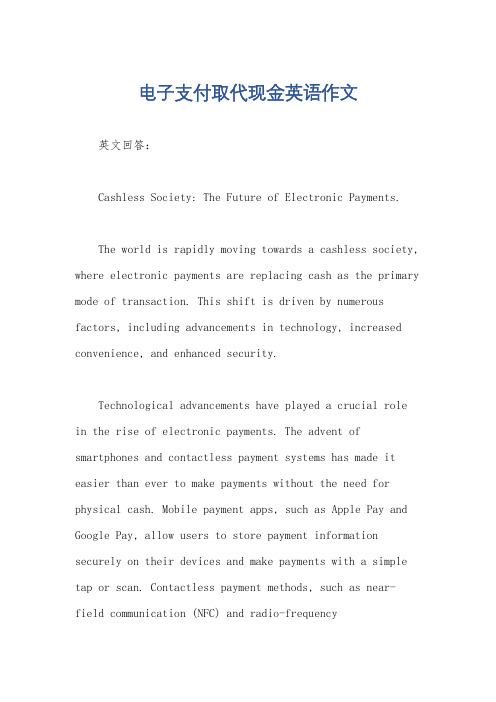
电子支付取代现金英语作文英文回答:Cashless Society: The Future of Electronic Payments.The world is rapidly moving towards a cashless society, where electronic payments are replacing cash as the primary mode of transaction. This shift is driven by numerous factors, including advancements in technology, increased convenience, and enhanced security.Technological advancements have played a crucial role in the rise of electronic payments. The advent of smartphones and contactless payment systems has made it easier than ever to make payments without the need for physical cash. Mobile payment apps, such as Apple Pay and Google Pay, allow users to store payment information securely on their devices and make payments with a simple tap or scan. Contactless payment methods, such as near-field communication (NFC) and radio-frequencyidentification (RFID), enable quick and convenient transactions without the exchange of any physical objects.Convenience is another key driver behind the adoption of electronic payments. Carrying cash can be cumbersome and risky, especially in large amounts. Electronic payments offer a hassle-free and secure alternative, eliminating the need to carry cash or worry about losing it. Additionally, electronic payments can be made from anywhere with an internet connection, making it convenient for online purchases and remote transactions.Security is another important aspect that has contributed to the increasing popularity of electronic payments. Cash is prone to theft, loss, and counterfeiting. Electronic payments, on the other hand, are typically protected by encryption and other security measures, making them more secure than cash. Payment providers often implement fraud detection systems to identify and prevent unauthorized transactions.Despite the numerous advantages of electronic payments,there are certain challenges and concerns that need to be addressed. One concern is the limited access to and availability of electronic payment systems, particularly in underserved areas. Additionally, there are some who prefer the anonymity and privacy provided by cash transactions.To fully realize the benefits of a cashless society, it is essential to address these challenges and concerns. Governments and payment providers must collaborate to ensure that electronic payment systems are accessible and inclusive for all. Additionally, it is important to develop and implement robust security measures to safeguard consumer data and prevent fraud.中文回答:无现金社会,电子支付的未来。
2024年无现金社会悄然兴起

05
商家适应策略及案例分析
Chapter
商家如何适应无现金社会趋势
数字化支付系统
商家需要建立数字化支付系统, 包括电子钱包、移动支付等,以
接受消费者的无现金支付。
优化支付流程
商家应优化支付流程,确保快速、 安全地完成交易,提升消费者体验 。
数据管理与分析
商家需建立完善的数据管理系统, 分析消费者支付行为,为精准营销 和个性化服务提供支持。
随着无现金社会的深入发展,网 络安全、数据隐私等问题将成为 重要挑战,需加强相关法规和监 管措施。
全面数字化 跨境支付便利化 金融体系变革
挑战与风险
未来,数字化支付将覆盖更多领 域,包括公共交通、医疗、教育 等,实现全面数字化。
无现金社会的发展将推动金融体 系的变革,提高金融服务的普惠 性和便捷性。
提供税收优惠和补贴
政府可以通过提供税收优惠和补贴等方式,降低无现金支付的成 本,提高其普及率和可接受性。
加强教育和宣传
政府应加强无现金支付的教育和宣传,提高公众对无现金社会的 认知度和接受度。
加强监管,确保市场公平竞争和消费者标准,规范无现金支付市场的秩序,确 保市场的公平竞争和消费者的权益保护。
06
消费者体验变化与心理调适
Chapter
消费者在无现金社会中体验变化
支付方式变革
随着移动支付、数字货币等新型支付方式的普及,消费者逐渐摆脱 对传统现金的依赖,享受便捷、高效的支付体验。
购物方式转变
无现金支付的普及推动了线上购物、无人超市等新型购物方式的发 展,消费者可以随时随地完成购物,且无需排队等候。
数据安全
保障用户数据和交易数据的安全,包括数据的加 密存储和传输,以及防止数据泄露和被滥用。
无现金社会英语作文

无现金社会英语作文English Answer:As technology continues to advance at an unprecedented pace, the world is rapidly moving towards becoming a cashless society. The use of physical cash is declining as people increasingly embrace digital payment methods such as credit cards, debit cards, and mobile wallets. This shift has significant implications for both individuals and society as a whole.One of the primary benefits of a cashless society is convenience. Digital payments are faster, easier, and more secure than traditional cash transactions. With a tap of a card or a scan of a smartphone, consumers can complete transactions in a matter of seconds. This saves time and effort, particularly in busy environments such as supermarkets or public transportation. Additionally, cashless payments eliminate the risk of carrying large amounts of cash, reducing the likelihood of theft or loss.Furthermore, a cashless society can promote financial inclusion. By providing alternative payment methods,digital payments make it possible for individuals who maynot have access to traditional banking services to participate in the financial system. Mobile wallets, for example, can be accessed by anyone with a smartphone, regardless of their credit history or socioeconomic status. This increased financial inclusion can lead to greater economic equality and stability.However, there are also some potential drawbacks to a cashless society. One concern is the potential for privacy breaches. When individuals make digital payments, they provide personal information that can be collected and used by companies and governments. This raises concerns about data security and the potential for identity theft. Governments and financial institutions must implementrobust measures to protect consumer data and prevent misuse.Another challenge is the digital divide. While digital payment methods are becoming increasingly widespread, thereare still some individuals who do not have access to the necessary technology. This can create a barrier tofinancial inclusion and limit the benefits of a cashless society. Governments and organizations need to address the digital divide by providing affordable internet access and financial literacy programs.Overall, the transition to a cashless society offers numerous advantages, including convenience, financial inclusion, and efficiency. However, it also presents challenges related to privacy and digital inequality. By carefully considering these factors and implementing appropriate measures, governments and financialinstitutions can harness the benefits of a cashless society while mitigating the potential risks.中文回答:随着技术以前所未有的速度不断发展,世界正在快速走向无现金社会。
是否应该推行无现金社会辩论辩题

是否应该推行无现金社会辩论辩题正方观点,应该推行无现金社会。
首先,无现金社会可以提高经济效率和便利性。
在无现金社会中,人们可以通过电子支付快速完成交易,避免了携带大量现金和找零的麻烦,节约了时间和精力。
据美国经济学家肯尼斯·罗格夫(Kenneth S. Rogoff)的研究表明,无现金社会可以减少黑市交易和逃税行为,有利于经济的规范和监管。
其次,无现金社会可以提高金融安全性。
在传统的现金交易中,存在被盗或丢失的风险,而电子支付可以通过密码、指纹等多重认证方式保障交易安全。
瑞典是一个无现金社会的典范,该国的研究表明,无现金社会可以减少抢劫和盗窃案件,提高社会的安全水平。
最后,无现金社会可以促进金融包容性。
在一些发展中国家和偏远地区,现金支付的成本较高,而无现金支付可以让更多的人参与到金融体系中来。
比尔·盖茨曾说过,“无现金支付可以让更多的人享受到金融服务,促进经济的包容性和可持续发展。
”。
综上所述,无现金社会可以提高经济效率和便利性,提高金融安全性,促进金融包容性,因此应该推行无现金社会。
反方观点,不应该推行无现金社会。
首先,无现金社会可能会增加数字鸿沟。
在一些地区和群体中,存在着数字化程度低、信息素养差的情况,无法适应无现金社会的支付方式。
如果强行推行无现金社会,可能会排斥这部分人群,加剧社会的不公平。
其次,无现金社会可能会增加隐私和安全风险。
在电子支付中,个人的交易记录和隐私信息可能会被泄露或滥用,而且网络支付存在被黑客攻击的风险。
著名的网络安全专家布鲁斯·施奈尔(Bruce Schneier)曾指出,“无现金社会可能会导致个人隐私权和金融安全性的下降。
”。
最后,无现金社会可能会增加社会的脆弱性。
在网络攻击、电力故障等突发事件中,如果无法进行电子支付,可能会造成社会的混乱和不稳定。
因此,保留现金支付作为备用方式是必要的。
综上所述,无现金社会可能会增加数字鸿沟,增加隐私和安全风险,增加社会的脆弱性,因此不应该推行无现金社会。
考研英语一阅读理解真题加解析1994 Passage 2

1994 Passage 2One hundred and thirteen million Americans have at least one bank-issued credit card. They give their owners automatic credit in stores, restaurants, and hotels, at home, across the country, and even abroad, and they make many banking services available as well. More and more of these credit cards can be read automatically , making it possible to withdraw or deposit money in scattered locations, whether or not the local branch bank is open. For many of us, the "cashless society" is not on the horizon — it's already here.While computers offer these conveniences to consumers, they have many advantages for sellers too. Electronic cash registers can do much more than simply ring up sales. They can keep a wide range of records, including who sold what, when, and to whom. This information allows businessmen to keep track of their list of goods by showing which items are being sold and how fast they are moving. Decisions to reorder or return goods to suppliers can then be made. At the same time these computers record which hours are busiest and which employees are the most efficient, allowing personnel and staffing assignments to be made accordingly. And they also identify preferred customers for promotional campaigns. Computers are relied on by manufacturers for similar reasons. Computer-analyzed marketing reports can help to decide which products to emphasize now, which to develop for the future, and which to drop. Computers keep track of goods in stock, of raw materials on hand, and even of the production process itself.Numerous other commercial enterprises, from theaters to magazine publishers, from gas and electric utilities to milk processors, bring better and more efficient services to consumers through the use of computers.55. According to the passage, the credit card enables its owner to ________.[A] withdraw as much money from the bank as he wishes[B] obtain more convenient services than other people do[C] enjoy greater trust from the storekeeper[D] cash money wherever he wishes to56. From the last sentence of the first paragraph we learn that ________.[A] in the future all the Americans will use credit cards[B] credit cards are mainly used in the United State today[C] nowadays many Americans do not pay in cash[D] it is now more convenient to use credit cards than before57. The phrase "ring up sales" (line 2, paragraph 2) most probably means "________".[A] make an order of goods[B] record sales on a cash register[C] call the sales manager[D] keep track of the goods in stock58. What is this passage mainly about?[A] Approaches to the commercial use of computers.[B] Conveniences brought about by computers in business.[C] Significance of automation in commercial enterprises.[D] Advantages of credit cards in business.重点词汇:deposit (v.n.存放;储蓄;沉淀)即de+pos+it,de-向下,pos 词根“放”,it 后缀,“放下它”。
无现金社会渐成趋势

政策制定和监管对无现金社会的影响
政策支持:政 府出台相关政 策,推动无现 金社会的发展
监管措施:政 府加强对无现 金社会的监管, 保障消费者权
益
法律法规:制 定相关法律法 规,规范无现 金社会的发展
国际合作:加 强国际合作, 共同推动无现 金社会的发展
THANK YOU
汇报人:XX
无现金社会趋势
汇报人:XX
目录
01 单 击 添 加 目 录 项 标 题 02 无 现 金 社 会 的 概 念 和 背 景 03 无 现 金 支 付 方 式 的 发 展 04 无 现 金 社 会 的 影 响 05 无 现 金 社 会 的 安 全 和 隐 私 保 护 06 无 现 金 社 会 的 未 来 展 望
移动支付的应用场景:购物、餐 饮、出行、缴费等
添加标题
添加标题
添加标题
添加标题
移动支付的发展历程:从短信支 付到二维码支付,再到NFC支付
移动支付的优势:便捷、安全、 高效
数字货币的发展前景
数字货币的定义和特点 数字货币的发展历程 数字货币在全球范围内的应用情况 数字货币的未来发展趋势和挑战
04
03
无现金支付方式的发展
电子支付的发展历程
信用卡支付:20世纪50年代开始,逐渐 普及
借记卡支付:20世纪70年代开始,逐渐 普及
移动支付:21世纪初开始,逐渐普及
电子钱包:21世纪初开始,逐渐普及
扫码支付:21世纪初开始,逐渐普及
生物识别支付:21世纪初开始,逐渐普 及
移动支付的普及和应用
移动支付的定义:通过手机等移 动设备进行支付
无现金社会还可以促进金融包容,为更多人提供便捷的金融服务。
无现金社会的起源和发展
英语外刊精读与练习:无现金社会
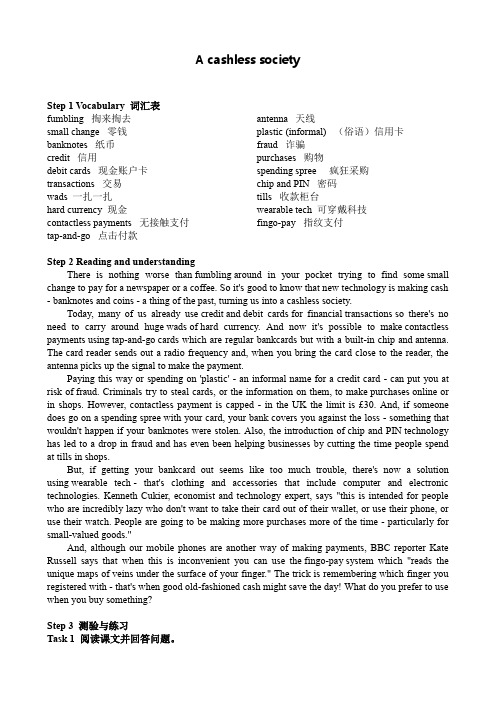
A cashless society Step 1 Vocabulary 词汇表fumbling 掏来掏去small change 零钱banknotes 纸币credit 信用debit cards 现金账户卡transactions 交易wads 一扎一扎hard currency 现金contactless payments 无接触支付tap-and-go 点击付款antenna 天线plastic (informal) (俗语)信用卡fraud 诈骗purchases 购物spending spree 疯狂采购chip and PIN 密码tills 收款柜台wearable tech 可穿戴科技fingo-pay 指纹支付Step 2 Reading and understandingThere is nothing worse than fumbling around in your pocket trying to find some small change to pay for a newspaper or a coffee. So it's good to know that new technology is making cash - banknotes and coins - a thing of the past, turning us into a cashless society.Today, many of us already use credit and debit cards for financial transactions so there's no need to carry around huge wads of hard currency. And now it's possible to make contactless payments using tap-and-go cards which are regular bankcards but with a built-in chip and antenna. The card reader sends out a radio frequency and, when you bring the card close to the reader, the antenna picks up the signal to make the payment.Paying this way or spending on 'plastic' - an informal name for a credit card - can put you at risk of fraud. Criminals try to steal cards, or the information on them, to make purchases online or in shops. However, contactless payment is capped -in the UK the limit is £30. And, if someone does go on a spending spree with your card, your bank covers you against the loss - something that wouldn't happen if your banknotes were stolen. Also, the introduction of chip and PIN technology has led to a drop in fraud and has even been helping businesses by cutting the time people spend at tills in shops.But, if getting your bankcard out seems like too much trouble, there's now a solution using wearable tech -that's clothing and accessories that include computer and electronic technologies. Kenneth Cukier, economist and technology expert, says "this is intended for people who are incredibly lazy who don't want to take their card out of their wallet, or use their phone, or use their watch. People are going to be making more purchases more of the time - particularly for small-valued goods."And, although our mobile phones are another way of making payments, BBC reporter Kate Russell says that when this is inconvenient you can use the fingo-pay system which "reads the unique maps of veins under the surface of your finger." The trick is remembering which finger you registered with - that's when good old-fashioned cash might save the day! What do you prefer to use when you buy something?Step 3 测验与练习Task 1阅读课文并回答问题。
无现金社会
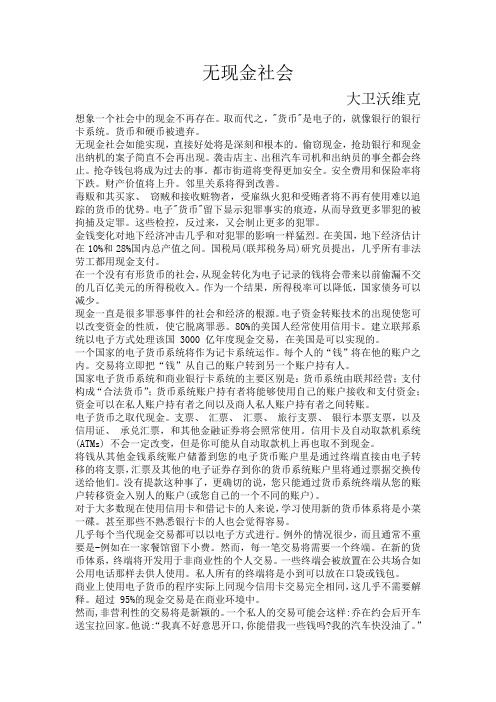
无现金社会大卫沃维克想象一个社会中的现金不再存在。
取而代之,"货币"是电子的,就像银行的银行卡系统。
货币和硬币被遗弃。
无现金社会如能实现,直接好处将是深刻和根本的。
偷窃现金,抢劫银行和现金出纳机的案子简直不会再出现。
袭击店主、出租汽车司机和出纳员的事全都会终止。
抢夺钱包将成为过去的事。
都市街道将变得更加安全。
安全费用和保险率将下跌。
财产价值将上升。
邻里关系将得到改善。
毒贩和其买家、窃贼和接收赃物者,受雇纵火犯和受贿者将不再有使用难以追踪的货币的优势。
电子"货币"留下显示犯罪事实的痕迹,从而导致更多罪犯的被拘捕及定罪。
这些检控,反过来,又会制止更多的犯罪。
金钱变化对地下经济冲击几乎和对犯罪的影响一样猛烈。
在美国,地下经济估计在10%和28%国内总产值之间。
国税局(联邦税务局)研究员提出,几乎所有非法劳工都用现金支付。
在一个没有有形货币的社会,从现金转化为电子记录的钱将会带来以前偷漏不交的几百亿美元的所得税收入。
作为一个结果,所得税率可以降低,国家债务可以减少。
现金一直是很多罪恶事件的社会和经济的根源。
电子资金转账技术的出现使您可以改变资金的性质,使它脱离罪恶。
80%的美国人经常使用信用卡。
建立联邦系统以电子方式处理该国 3000 亿年度现金交易,在美国是可以实现的。
一个国家的电子货币系统将作为记卡系统运作。
每个人的“钱”将在他的账户之内。
交易将立即把“钱”从自己的账户转到另一个账户持有人。
国家电子货币系统和商业银行卡系统的主要区别是:货币系统由联邦经营;支付构成“合法货币”;货币系统账户持有者将能够使用自己的账户接收和支付资金;资金可以在私人账户持有者之间以及商人私人账户持有者之间转账。
电子货币之取代现金。
支票、汇票、汇票、旅行支票、银行本票支票,以及信用证、承兑汇票,和其他金融证券将会照常使用。
信用卡及自动取款机系统(ATMs) 不会一定改变,但是你可能从自动取款机上再也取不到现金。
无现金社会的优缺点英语作文
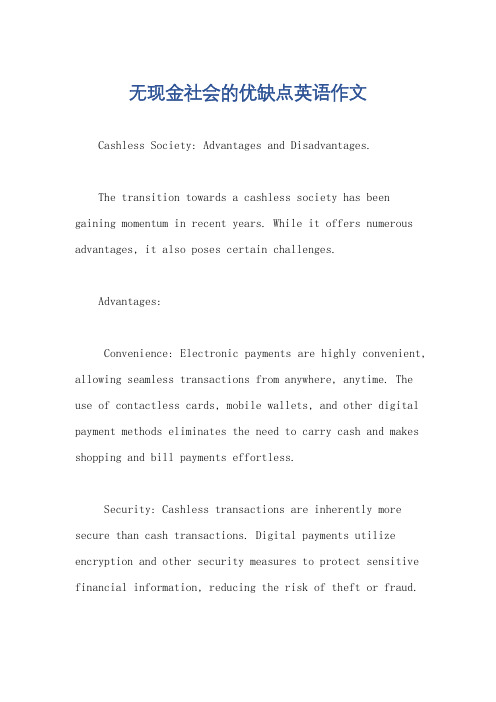
无现金社会的优缺点英语作文Cashless Society: Advantages and Disadvantages.The transition towards a cashless society has been gaining momentum in recent years. While it offers numerous advantages, it also poses certain challenges.Advantages:Convenience: Electronic payments are highly convenient, allowing seamless transactions from anywhere, anytime. The use of contactless cards, mobile wallets, and other digital payment methods eliminates the need to carry cash and makes shopping and bill payments effortless.Security: Cashless transactions are inherently more secure than cash transactions. Digital payments utilize encryption and other security measures to protect sensitive financial information, reducing the risk of theft or fraud.Efficiency: Electronic payments are much faster and more efficient than cash transactions. They eliminate the need for counting, verifying, and handling physical currency, saving time and reducing operational costs for businesses.Financial Inclusion: A cashless society can promote financial inclusion by extending access to financial services to individuals who may have difficulty accessing traditional banking systems. Digital payment platforms can provide financial services such as mobile banking, micro-lending, and insurance to underserved populations.Transparency: Electronic payments create a digital record of transactions, providing greater transparency and accountability. This can help prevent corruption, money laundering, and other financial crimes.Disadvantages:Dependence on Technology: A cashless society heavily relies on technology, which can be a concern in areas withlimited access to reliable internet or electricity. Individuals who lack access to digital payment platforms or are not comfortable with technology may face challenges in participating in the economy.Privacy Concerns: Digital payment platforms collect and store personal data, which can raise privacy concerns. The misuse or breach of this data can lead to identity theft, financial losses, or other privacy violations.Cost: Cashless transactions may incur fees, which can be a burden for individuals or businesses. These fees can add up over time and may discourage the adoption of cashless payments.Exclusion of the Unbanked: A cashless society can further marginalize individuals who are unbanked or underbanked. These individuals may lack access to digital payment platforms or have difficulty meeting the requirements to open bank accounts.Loss of Physical Currency's Benefits: Physicalcurrency offers certain advantages, such as anonymity in transactions and the ability to store value outside of the banking system. Eliminating cash can deprive individuals of these benefits and potentially undermine their financial autonomy.中文回答:无现金社会的优点和缺点。
是否应该推行无现金社会辩论辩题

是否应该推行无现金社会辩论辩题正方,应该推行无现金社会。
首先,推行无现金社会可以有效减少犯罪率。
现金交易容易带来偷税漏税、洗钱等问题,而无现金社会可以通过电子支付系统来记录每一笔交易,有效打击犯罪行为。
据世界银行数据显示,瑞典是世界上最接近无现金社会的国家之一,犯罪率也相对较低,这充分证明了无现金社会对于减少犯罪的积极作用。
其次,推行无现金社会可以提高经济效率。
现金交易需要时间和成本来进行清点、储存和运输,而无现金社会可以通过数字化支付方式来实现快捷便利的交易,提高了交易效率,促进了经济发展。
例如,中国的电子支付市场已经成为全球最大的市场之一,为经济增长提供了强大的支撑。
最后,推行无现金社会可以促进金融包容性。
在一些偏远地区或发展中国家,现金交易可能会面临交易成本高、支付不便等问题,而无现金社会可以通过普及电子支付方式来让更多人参与到经济活动中来。
正如印度总理莫迪曾经说过的一句话,“数字印度是包容印度”,无现金社会可以促进金融包容性,让更多人受益于现代金融服务。
综上所述,推行无现金社会可以减少犯罪率、提高经济效率、促进金融包容性,是符合时代潮流的举措。
反方,不应该推行无现金社会。
首先,推行无现金社会可能会加剧社会分化。
在无现金社会中,对于一些贫困地区或贫困人群来说,缺乏金融知识、技术设施等问题可能会导致他们无法适应新的支付方式,从而加剧了社会分化。
例如,印度在实施“废钞令”后,许多贫困人群因为无法使用电子支付方式而面临生活困难,这就是无现金社会可能带来的负面影响。
其次,推行无现金社会可能会带来隐私泄露的风险。
在无现金社会中,个人的交易记录将会被数字化并存储在系统中,一旦系统遭到黑客攻击或者政府滥用,个人隐私将面临泄露的风险。
正如美国前国家安全局承包商斯诺登所揭露的那样,数字化支付系统可能会成为监控和侵犯隐私的工具。
最后,推行无现金社会可能会增加社会脆弱性。
在无现金社会中,一旦电子支付系统遭遇故障或者网络瘫痪,整个社会的经济活动将会受到极大影响,甚至导致经济崩溃。
是否应该推行无现金社会辩论辩题

是否应该推行无现金社会辩论辩题正方观点,应该推行无现金社会。
1. 便捷性,无现金社会可以节省人们排队等待的时间,提高支
付效率,方便快捷。
2. 安全性,无现金社会可以减少现金交易中的盗窃和抢劫,提
高交易安全性。
3. 环保性,无现金社会可以减少纸币的使用,减少对环境的破坏。
4. 经济发展,无现金社会可以促进电子支付和金融科技的发展,推动经济的现代化和数字化。
反方观点,不应该推行无现金社会。
1. 隐私安全,无现金社会可能会增加个人信息泄露和数据安全
问题,对个人隐私构成威胁。
2. 数字鸿沟,无现金社会可能会造成数字鸿沟,让不熟悉电子支付的人无法参与到社会经济中来。
3. 社会排斥,无现金社会可能会排斥老年人和贫困人群,让他们无法适应新的支付方式。
4. 政府控制,无现金社会可能会增加政府对个人财务的监控和控制,损害个人自由。
名人名句及经典案例:
1. “金钱是一切邪恶的根源。
” -《圣经》。
2. 瑞典是一个推行无现金社会的案例,但也引发了一些问题,如数字鸿沟和隐私安全等。
综上所述,无现金社会在便捷性、安全性、环保性和经济发展方面有其优势,但也存在隐私安全、数字鸿沟、社会排斥和政府控制等问题。
因此,我们应该在推行无现金社会的过程中,充分考虑这些问题,采取有效措施解决,使无现金社会更加平衡和可持续。
是否应该推行无现金社会辩论辩题

是否应该推行无现金社会辩论辩题正方,应该推行无现金社会。
首先,推行无现金社会可以有效减少犯罪率。
现金交易容易导致偷税漏税、洗钱、贩毒等犯罪行为,而无现金社会可以通过电子支付和数字化交易来追踪和监控资金流动,从而减少犯罪活动的发生。
正如著名经济学家弗里德里希·哈耶克所说,“现金流通是犯罪的温床。
”因此,推行无现金社会可以有效维护社会安全和稳定。
其次,无现金社会可以提高经济效率。
现金交易需要时间和成本来进行清点、储存和运输,而无现金社会可以节省这些成本,提高交易的效率。
同时,数字化支付也可以促进消费,推动经济增长。
正如美国经济学家肯尼思·罗格夫所说,“无现金社会可以提高经济效率,促进经济增长。
”。
最后,推行无现金社会可以促进金融包容性。
许多地区和人群因为没有银行账户或信用卡而无法参与现金交易,而无现金社会可以通过电子支付和移动支付让更多的人群融入到金融体系当中。
这也符合联合国可持续发展目标中的金融包容性要求。
综上所述,推行无现金社会可以减少犯罪率、提高经济效率和促进金融包容性,是符合社会发展趋势的举措。
反方,不应该推行无现金社会。
首先,推行无现金社会可能会加剧数字鸿沟。
许多地区和人群尚未具备数字化支付的能力和条件,如果强行推行无现金社会,可能会使这些人群无法参与到经济活动中,加剧贫富差距。
正如联合国秘书长安东尼奥·古特雷斯所说,“数字化支付的普及应该是包容性的,而不是排他性的。
”。
其次,无现金社会可能会导致个人隐私权受到侵犯。
数字化支付和电子交易需要个人信息和数据的交换,一旦这些信息泄露或被滥用,将对个人隐私造成严重威胁。
正如美国隐私权活动家爱德华·斯诺登所指出的,“数字支付可能会导致个人隐私权受到侵犯。
”。
最后,无现金社会可能会使一些传统行业和就业岗位受到冲击。
许多人依靠现金交易来维持生计,如果无现金社会导致这些行业和岗位的消失,将对社会稳定和就业造成负面影响。
是否应该推行无现金社会的辩论辩题

是否应该推行无现金社会的辩论辩题正方观点,应该推行无现金社会。
首先,推行无现金社会可以有效减少犯罪活动。
现金交易容易导致偷税漏税、洗钱等违法行为,而无现金社会可以通过数字化支付方式进行交易,从而减少了犯罪活动的发生。
正如美国经济学家凯文·沃伦(Kevin Warsh)所说,“无现金社会可以有效减少了犯罪活动,提高了社会安全性。
”。
其次,推行无现金社会有利于提高经济效率。
现金交易需要人工清点、储存和运输,而无现金社会可以通过电子支付方式实现快速、便捷的交易,提高了交易效率。
瑞典经济学家斯特凡·英格瓦森(Stefan Ingves)曾指出,“无现金社会可以提高经济效率,促进经济发展。
”。
最后,推行无现金社会可以促进金融包容性。
在无现金社会中,即使是没有银行账户的人也可以通过移动支付等方式进行交易,从而增加了金融包容性。
印度总理纳伦德拉·莫迪(Narendra Modi)曾表示,“无现金社会可以促进金融包容性,让更多的人享受到金融服务。
”。
综上所述,推行无现金社会有利于减少犯罪活动、提高经济效率和促进金融包容性,因此应该推行无现金社会。
反方观点,不应该推行无现金社会。
首先,推行无现金社会可能会加剧数字鸿沟。
在一些偏远地区或贫困地区,电子支付设施可能不够完善,居民缺乏相关的数字支付技能,因此推行无现金社会可能会使这些地区的居民无法参与到经济交易中。
联合国数字经济和社会研究所的一项研究指出,“推行无现金社会可能会加剧数字鸿沟,造成一些人无法享受到数字化支付带来的便利。
”。
其次,推行无现金社会可能会威胁个人隐私。
在无现金社会中,所有的交易记录都将被记录在电子系统中,个人的消费行为将会被完全透明化,这可能会对个人隐私构成威胁。
美国计算机科学家布鲁斯·施奈尔(Bruce Schneier)曾警告,“推行无现金社会可能会威胁个人隐私,使个人的消费行为暴露无遗。
”。
最后,推行无现金社会可能会使一些传统行业失业。
是否应该推行无现金社会?辩论辩题

是否应该推行无现金社会?辩论辩题正方辩手观点,应该推行无现金社会。
首先,推行无现金社会可以有效减少犯罪率。
据统计,很多犯罪活动都是通过现金进行交易的,例如贩毒、走私等。
如果没有现金,这些犯罪活动就会受到很大的限制,从而减少犯罪率。
正如著名经济学家凯恩斯所说,“现金是犯罪的根源。
”因此,推行无现金社会可以有效地减少犯罪活动。
其次,无现金社会可以促进经济发展。
现金交易存在很多弊端,例如易造假、难追踪等。
而无现金社会可以通过电子支付、移动支付等方式来进行交易,这不仅可以提高交易的安全性,还可以促进经济的发展。
正如美国前总统奥巴马曾经说过,“无现金社会是经济发展的必然趋势。
”。
最后,无现金社会可以提高金融效率。
现金交易存在很多环节,例如银行存取款、钞票流通等,而这些环节都会造成不必要的时间和成本浪费。
而无现金社会可以通过电子支付等方式来进行交易,大大提高了金融的效率。
正如著名企业家比尔·盖茨所说,“无现金社会可以提高金融效率,让人们更加便利地进行交易。
”。
综上所述,推行无现金社会可以有效减少犯罪率、促进经济发展、提高金融效率,因此应该推行无现金社会。
反方辩手观点,不应该推行无现金社会。
首先,推行无现金社会可能会造成社会不公平。
很多人依赖现金进行交易,例如老年人、农村居民等,如果推行无现金社会,这些人可能会面临交易不便的问题,从而造成社会不公平。
正如著名经济学家弗里德曼曾经说过,“无现金社会可能会造成社会不公平。
”。
其次,无现金社会可能会带来隐私泄露的问题。
在电子支付、移动支付等方式下,个人的交易信息可能会被泄露,从而造成隐私泄露的问题。
这不仅会影响个人的权益,还可能会造成金融安全的问题。
正如著名计算机专家斯诺登曾经揭露的那样,电子支付可能会带来隐私泄露的问题。
最后,无现金社会可能会带来技术风险。
电子支付、移动支付等方式都依赖于技术的支持,如果技术出现问题,就可能会造成交易中断、资金损失等问题。
- 1、下载文档前请自行甄别文档内容的完整性,平台不提供额外的编辑、内容补充、找答案等附加服务。
- 2、"仅部分预览"的文档,不可在线预览部分如存在完整性等问题,可反馈申请退款(可完整预览的文档不适用该条件!)。
- 3、如文档侵犯您的权益,请联系客服反馈,我们会尽快为您处理(人工客服工作时间:9:00-18:30)。
无现金社会cashless society
China was the first country in the world to use paper money but centuries later the soaring popularity of mobile payment has some analysts forecasting it could become the first cashless society in the next decade.
中国是世界上第一个使用纸币的国家,但到了几个世纪后的现在,随着移动支付的普及程度不断提高,一些分析师预测,中国或在未来十年成为首个无现金社会。
中国正掀起一场无现金革命(cashless revolution)。
上海的一家面馆或深圳的一名街头艺人(busker)在收款时,只需要一个免费的微信账号和一个打印好的二维码(a free WeChat account and a printout of a QR code)。
在中国大部分地区,几乎每台收银机(cash register)旁边都有二维码。
艾瑞咨询称,2016年,中国第三方移动支付成交商品总额(gross merchandise value of third-party mobile payment)较上年同期增长了逾200%,达到38万亿元。
中国市场研究集团估计,中国的移动支付市场(mobile payment market)规模已经是美国的40-50倍。
移动支付的最大吸引力在于方便(a key attraction of mobile payment is convenience),人们可以携带少量或不带现金出行。
然而,移动支付的安全性也越来越引起关注。
联合国的"优于现金联盟(Better Than Cash Alliance)"称,移动支付方仍在努力实现创新与监管之间的平衡(balance between innovation and regulation),且在积极地采取措施来降低财务风险和欺诈(reduce financial risk and fraud)。
相关词汇
金融工具financial instruments
实体店bricks and mortar store
短期贷款short-term lending
消费者和商业信用评分consumer and business credit scoring。
